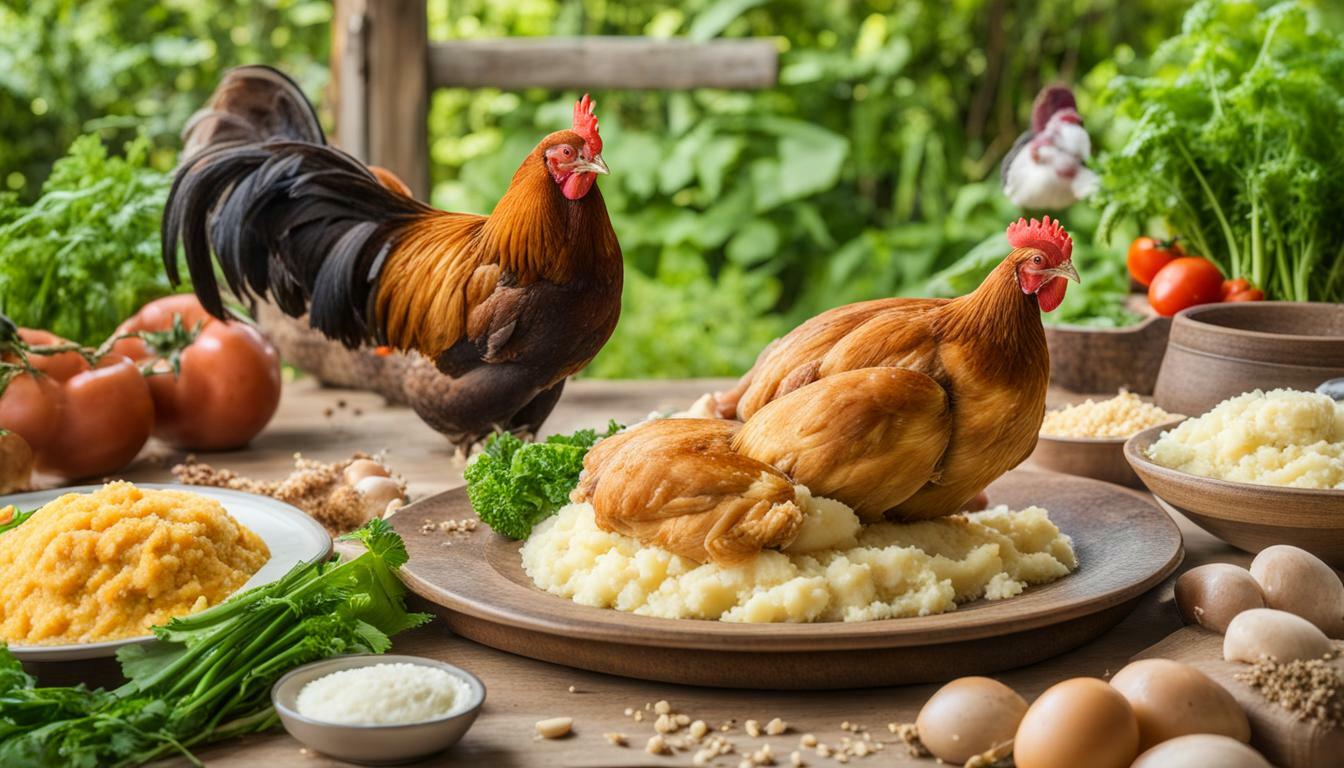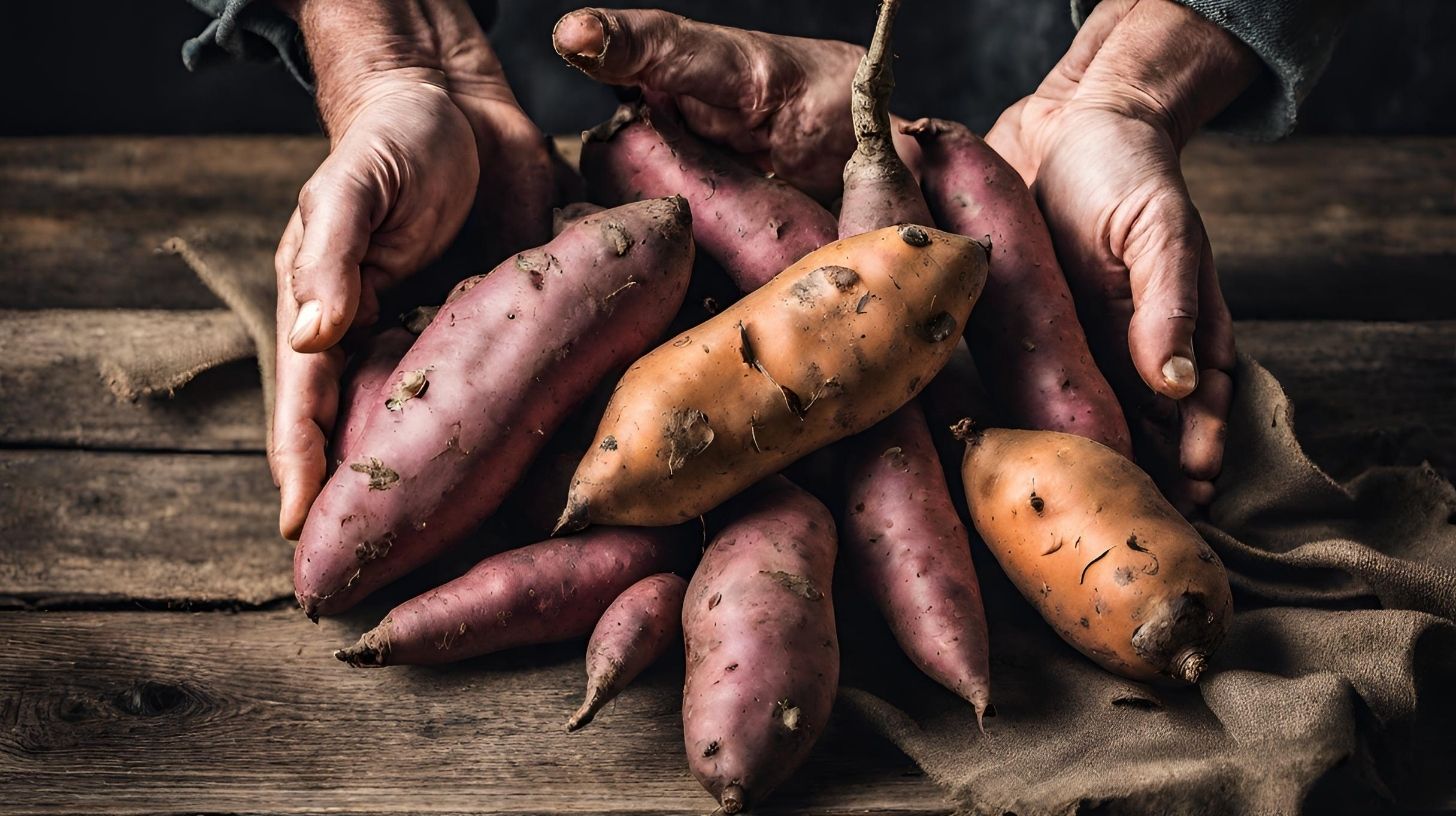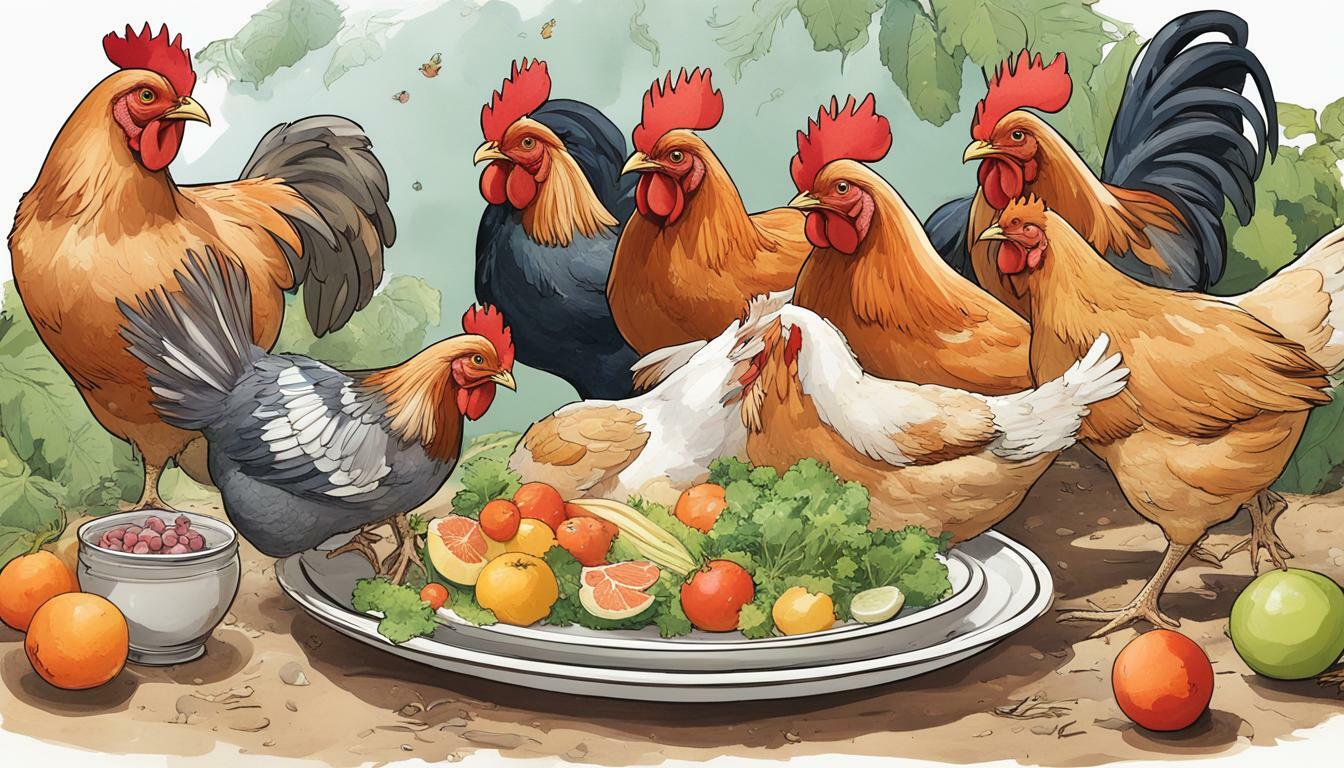Can Chickens Eat Almonds? Nutritional Facts And Safety
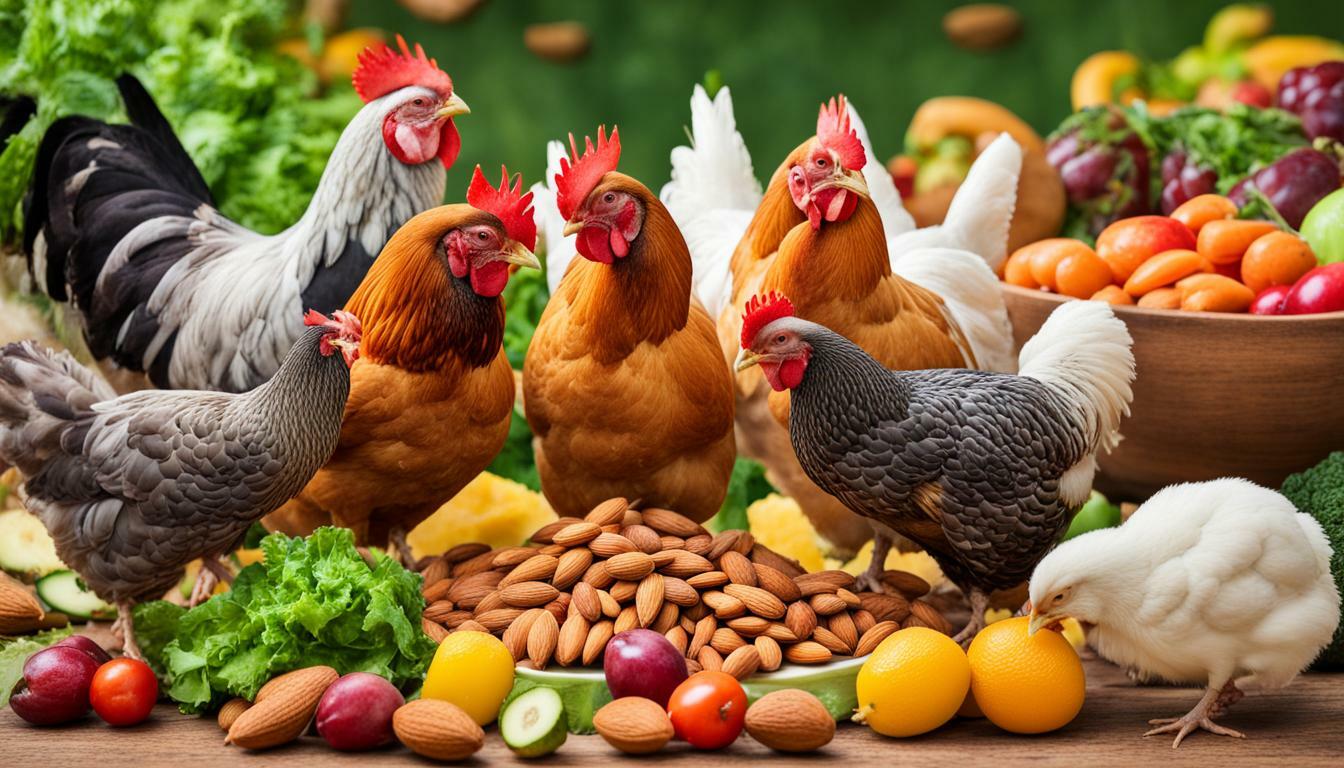
Table of content:
- Are Almonds Good for Chickens? Nutrition Facts
- Are Almonds Safe for Chickens? Concerns and Precautions
- How Many Almonds Can Chickens Eat? Feeding Guidelines
- How Often Should You Feed Almonds to Chickens?
- Should You Soak Almonds Before Feeding to Chickens?
- What is the Best Way to Feed Almonds to Chickens?
- Are Almonds Good for Chickens’ Egg-Laying and Egg Quality?
- Can Almonds for Chickens Cause Weight Gain or Health Issues?
- Do Chickens Like Eating Almonds?
- What are the Best Almonds for Chickens?
- Do Chickens Like Eating Other Nuts Besides Almonds?
- Are There Any Alternatives to Feeding Chickens Almonds?
- Frequently Asked Questions about Feeding Chickens Almonds
- Conclusion
Almonds are a popular snack for humans, but can chickens eat almonds too? This comprehensive guide will cover everything you need to know about feeding almonds to chickens.
Key Takeaways:
- Almonds are safe for chickens to eat in moderation. They provide healthy fats, protein, vitamins and minerals.
- Limit almonds to an occasional treat. Too many may lead to obesity or other health problems.
- Shelled, unsalted almonds are best. Avoid raw almonds which contain cyanide.
- Chop or grind almonds into small pieces so chickens can digest them properly.
- Soak almonds before feeding to soften them and remove toxins.
- Feed almonds to adult chickens only. Limit or avoid for chicks.
- Almonds can help deter rodents, satisfy bored chickens and provide essential nutrients. But layer feed should be the main diet.
Almonds can definitely be part of a balanced diet for backyard chickens. Like most treats, moderation is key to gaining benefits without causing harm. Keep reading for more details!
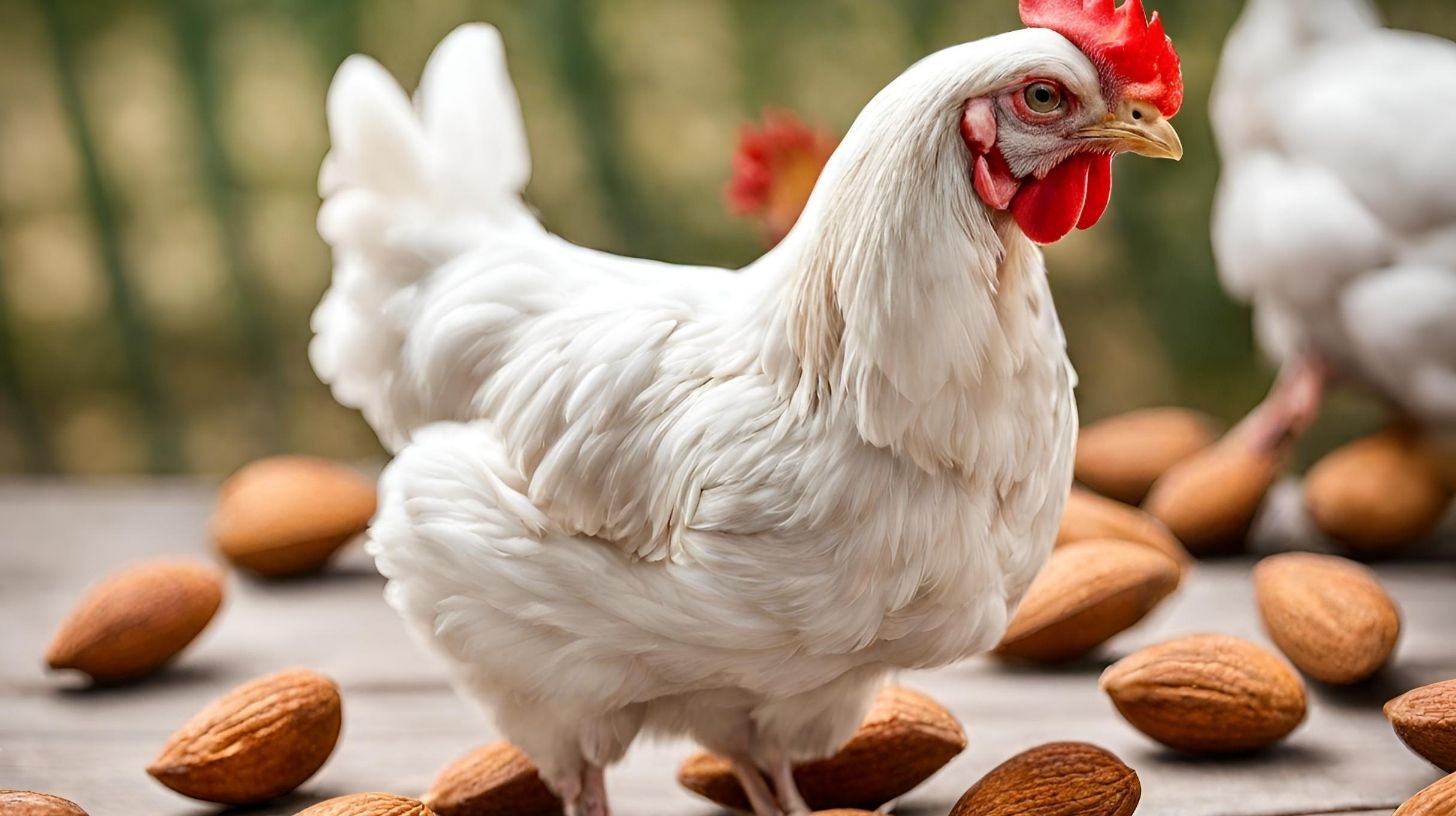 Are Almonds Good for Chickens? Nutrition Facts
Are Almonds Good for Chickens? Nutrition Facts
Here’s a quick look at the benefits of feeding chickens almonds:
- High in protein – 18g per 1 ounce serving
- Excellent source of vitamin E, magnesium, manganese, copper, phosphorus
- Good fats – mostly unsaturated including omega-3s
- Moderate calories and carbs
The nutritional profile of almonds make them a beneficial supplemental feed for chickens.
The protein and fats provide concentrated energy. And chickens gain vital vitamins and minerals like calcium for strong eggshells.
Compared to peanuts or sunflower seeds, almonds are lower in fat. The fats they contain are largely heart-healthy, unsaturated fats instead of saturated.
Almonds do contain carbs, but in moderation. Too many high-carb treats can lead to weight gain.
Plus, scientific research in humans has linked almonds to many health benefits including:
- Lower blood pressure, cholesterol and blood sugar
- Reduced inflammation
- Antioxidant and anti-cancer effects
It’s likely chickens can gain similar advantages by occasionally eating almonds as part of a nutritious diet.
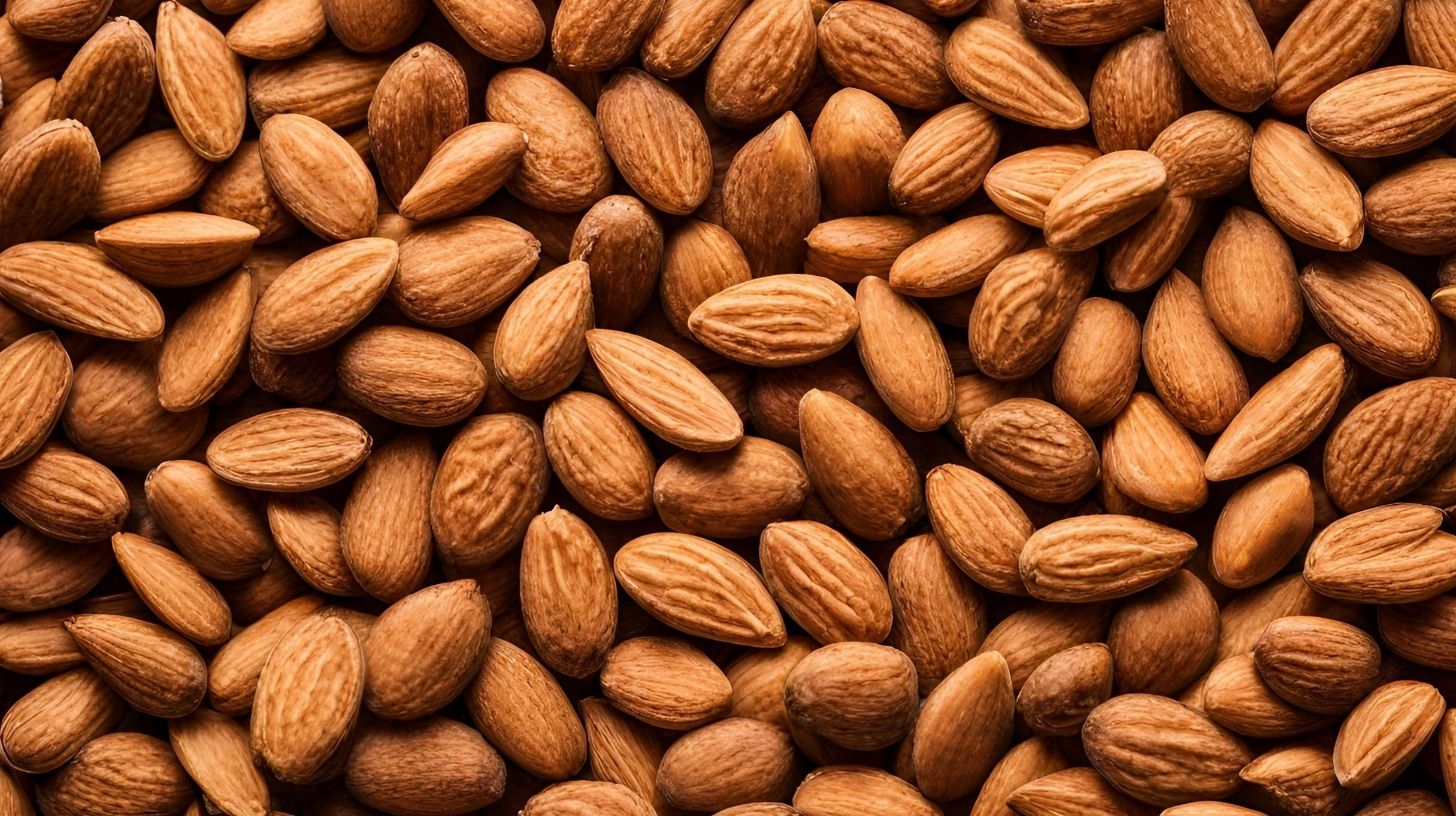 Are Almonds Safe for Chickens? Concerns and Precautions
Are Almonds Safe for Chickens? Concerns and Precautions
Almonds are safe for chickens in moderation. But there are some precautions to take:
Avoid Raw Almonds
Raw almonds contain a form of cyanide, which is toxic. However, roasting deactivates the compound.
Cooked, roasted or blanched almonds are safe. Avoid truly raw nuts.
Limit Almond Consumption
While healthy fats are beneficial, too many leads to obesity. Limit almonds to a sprinkle or 1-2 nuts per chicken, 1-2 times per week.
Prevent Choking Hazards
Whole almonds can get stuck in a chicken’s crop or throat. Always finely chop, crush or grind shelled nuts before feeding.
Soak Them First
Soaking almonds removes anti-nutrients like phytic acid and helps chickens digest them better.
Feed Only to Adult Birds
Chicks’ digestive systems are too immature to handle almonds. Wait until 6 months old.
By taking these precautions, almonds can be a safe, nutritious supplemental feed. But moderation is key.
| Nutrient | 1 Ounce (28g) Almonds | % Daily Value* |
|---|---|---|
| Calories | 164 | |
| Protein | 6 g | |
| Fat | 15 g | |
| Fiber | 4 g | 14% |
| Calcium | 75 mg | 8% |
| Iron | 1 mg | 6% |
*Based on diet of 2000 calories per day
How Many Almonds Can Chickens Eat? Feeding Guidelines
There’s no exact amount of almonds chickens can safely eat. It depends on the size of your flock and other factors.
For backyard flocks, here are some general feeding guidelines to follow:
- No more than 1-2 almonds per adult chicken, 1-2x per week.
- Adjust amounts based on chicken size – bantams need less.
- Split the allotted almonds into multiple feedings.
- Provide almonds as an occasional treat – not a daily meal.
- Mix almonds into scratch or treat balls along with other ingredients.
Monitor your chickens after feeding almonds. Reduce the quantity if:
- You see undigested almonds in the manure.
- Chickens become overweight.
- Egg production declines.
- Chickens develop diarrhea or other signs of illness.
When unsure, err on the side of less with high-fat foods like nuts. It’s easier to gradually increase than reduce feed once chickens are accustomed to it.
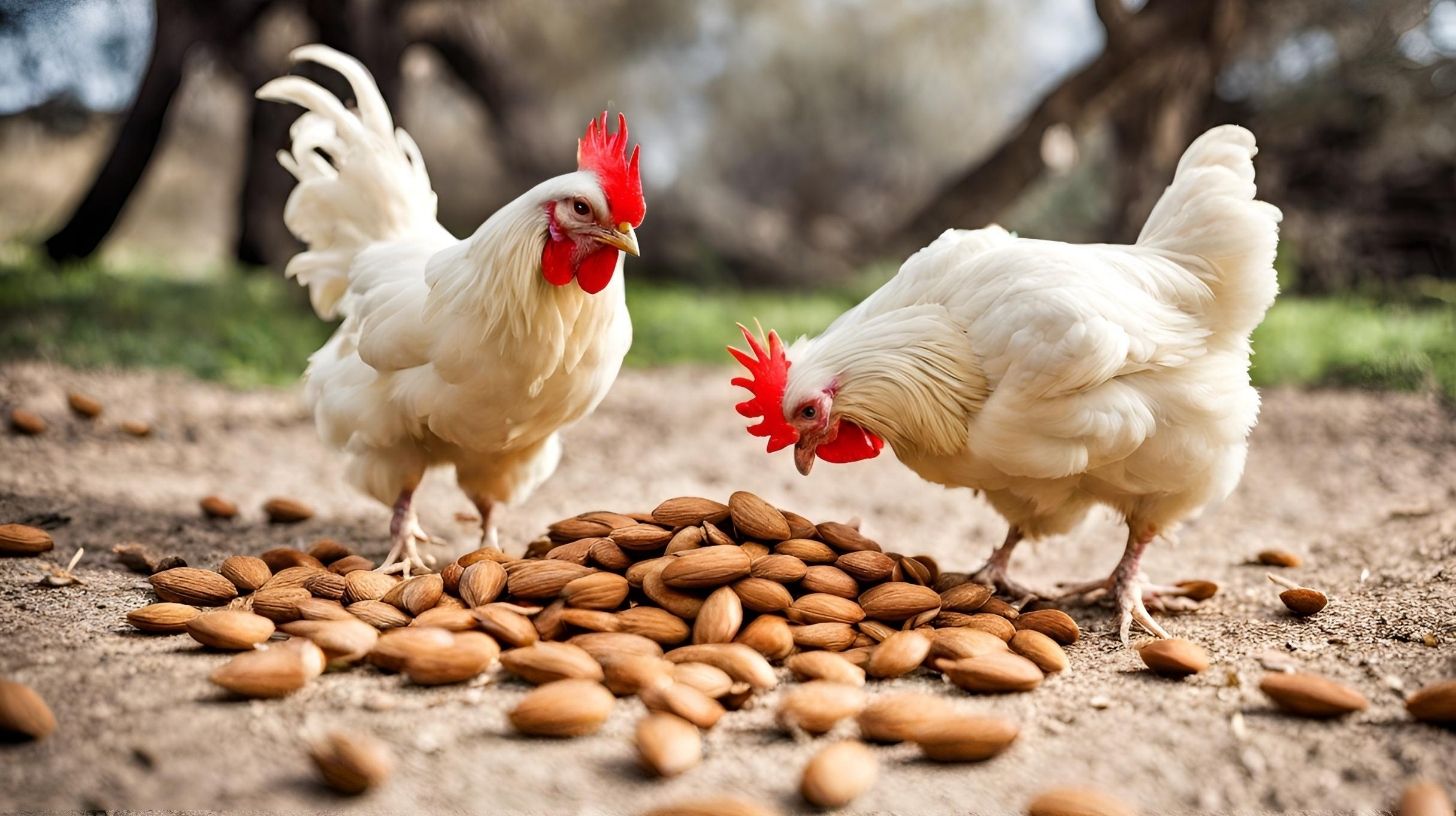 How Often Should You Feed Almonds to Chickens?
How Often Should You Feed Almonds to Chickens?
Most experts recommend feeding almonds no more than 1-2 times per week. Here are some tips on frequency:
- Split the weekly allotment into multiple small feedings vs. one large portion.
- Feed almonds as an occasional treat, not a main dietary component.
- Rotate almonds with a variety of other healthy snacks like mealworms, berries, leafy greens, squash, oats, etc.
- Avoid feeding almonds (or any treats) every day. This can lead to obesity and related problems.
- Base frequency on how readily your flock eats almonds. Reduce if chickens seem to have decreased appetite for other feed.
Pay attention to your chickens’ consumption habits. Some may love almonds more than others and eat too many if allowed. Keep an eye out and adjust portions for greedy eaters.
Should You Soak Almonds Before Feeding to Chickens?
Many chicken keepers recommend soaking shelled almonds in water before feeding. Here’s why this helps:
- Softens almonds so easier to crush/grind and for chickens to digest
- Removes phytic acid – an anti-nutrient that binds minerals
- Increases nutrient absorption – chickens benefit more from soaked almonds
- Provides hydration – especially helpful in summer
The easiest method is to soak almonds overnight, or at least 2-4 hours. Then rinse and drain before feeding.
Soaking is an optional but beneficial step that improves almonds’ nutritional value for chickens.
What is the Best Way to Feed Almonds to Chickens?
To safely feed almonds, follow these tips:
- Use shelled, not in-shell, to reduce choking hazard
- Avoid raw almonds – cook or roast nuts first to remove toxins
- Chop, crush or grind almonds into small pieces
- Mix with crumble or pellet feed
- Scatter in garden for foraging
- Hide inside treat balls with other ingredients
- Soak before feeding to soften texture
Feeding chopped or crushed almonds reduces risk of crop impaction or choking. It also allows chickens to fully digest and absorb the nutrients.
Sprinkling small almond pieces into feeders or gardens makes a fun protein-rich scavenging snack. You can also stuff inside treat balls along with grain, seeds, greens or fruit.
Are Almonds Good for Chickens’ Egg-Laying and Egg Quality?
Feeding chickens a balanced diet with treats like almonds can benefit egg production. But almonds aren’t a magic bullet for better eggs.
Here’s how almonds may help:
- Protein supports egg production.
- Calcium and vitamin D are essential for eggshell strength.
- Anti-oxidants like vitamin E improve immunity and nutrition absorption.
However, layer feed or crumble provides a complete diet for optimum eggs. Limit treats to no more than 10% of total feed. An overload of treats like almonds replaces balanced nutrition and can decrease production.
If you notice a drop in eggs after feeding almonds, reduce the amount or frequency. Focus on providing a quality complete feed as the base diet.
Can Almonds for Chickens Cause Weight Gain or Health Issues?
While almonds provide healthy fats, too many may lead to obesity or other health problems like:
- Fatty liver disease – excess fat accumulates in liver
- Reduced egg-laying – obesity strains the reproductive system
- Vitamin deficiencies – from a diet too high in fat
- Respiratory issues – excess weight compresses organs
- Joint pain – extra weight puts strain on legs and feet
To prevent obesity and related issues:
- Limit almonds to a sprinkle or 1-2 nuts per chicken, 1-2x per week
- Soak almonds before feeding – reduces calories
- Avoid if chickens become overweight
- Mix into feed instead of offering almonds alone
Do Chickens Like Eating Almonds?
Most chickens do enjoy eating almonds, especially as an occasional treat. Here’s why:
- Almonds offer a satisfying crunch chickens like
- The taste is usually pleasing and interesting
- Foraging almonds provides mental stimulation
- high in protein and fats chickens crave
Watch your flock’s reaction when you first offer almonds. If they seem hesitant, crush the nuts finer or soak to soften.
You may notice preferences between individual chickens. Limit or avoid almonds for any birds that refuse them.
Take care not to overfeed to greedy eaters who love almonds! It’s safer to underfeed treats than overfeed.
What are the Best Almonds for Chickens?
Look for shelled, roasted almonds without flavorings or salt:
- Shelled makes it easier and safer to chop small
- Roasted removes toxic compounds like cyanide
- No added flavors/salt – chickens don’t need extra sodiumChoosing plain roasted almonds avoids any additives that could be harmful. Opt for certified organic when possible.
You can also offer blanched or slivered almonds. Just chop the pieces finer to prevent choking.
Avoid offering almonds still in the shell, as chickens can break teeth trying to crack them open.
Do Chickens Like Eating Other Nuts Besides Almonds?
Chickens can safely enjoy a variety of nuts in moderation. Some other good options are:
- Peanuts
- Walnuts
- Pecans
- Hazelnuts
- Pine nuts
- Pistachios
Always remove shells, chop/grind into small bits, and limit portion sizes.
Rotate different types of nuts to add diversity. Soaked and sprouted nuts tend to be most digestible.
Are There Any Alternatives to Feeding Chickens Almonds?
If you prefer not to feed whole almonds, here are some alternatives that provide similar nutrition:
- Almond butter – spreads easily on treats.
- Almond meal – use in baked treats.
- Crushed almond bits – sprinkled on feed.
- Other nuts like walnuts, pecans, peanuts.
- Seeds like sunflower, pumpkin, flax.
- Sprouted seeds – highly digestible.
- Legumes – soybeans, lentils, peas.
- Grain – oats, barley, quinoa.
There are many options for giving chickens supplemental protein, healthy fats, and nutrients like magnesium, fiber and vitamin E found in almonds.
Focus on variety and moderation to prevent boredom and obesity.
Frequently Asked Questions about Feeding Chickens Almonds
Can chickens eat roasted almonds?
Yes, roasted almonds are the best choice. Roasting destroys compounds like cyanide that can be toxic to chickens. Just be sure to chop or grind roasted almonds before feeding.
What happens if chickens eat too many almonds?
Eating too many may lead to obesity, decreased egg production, respiratory issues, liver problems and other health issues. Limit almonds to a treat, not a main diet component.
Why shouldn’t you feed chickens raw almonds?
Raw almonds naturally contain cyanide, a toxic compound. Roasting destroys the toxin making almonds safe for chickens.
Is it okay to feed chickens salted almonds?
Avoid salted nuts. The excess sodium is not healthy for chickens. Opt for plain roasted or blanched almonds with no added flavorings.
Can you feed almond shells to chickens?
It’s best not to feed the outer shells. These are difficult for chickens to break down and digest properly. Shelled almonds are safer and healthier.
Can baby chicks eat almonds?
No, wait until chickens are at least 6 months old before introducing whole almonds. Chicks’ digestive systems cannot properly process nuts.
Can chickens eat almond butter?
Yes, almond butter makes a good alternative to whole almonds. Look for unsweetened, natural almond butter. Spread it on treats or mix into feed.
Conclusion
When fed properly, almonds make a healthy supplemental feed that provides protein, energy and key nutrients chickens need. Limit to a sprinkle or 1-2 nuts per chicken, 1-2 times weekly at most.
Chop or grind shelled, roasted almonds before feeding. Better to underfeed than overfeed treats. Provide almonds occasionally as part of a balanced diet and chickens can safely enjoy the benefits of this nutritious snack.
Welcome. I’m Adreena Shanum, the proud owner of this website, and I am incredibly passionate about animals, especially poultry. I founded adreenapets.com as a labor of love, stemming from my desire to share my knowledge and experiences with poultry enthusiasts worldwide.


